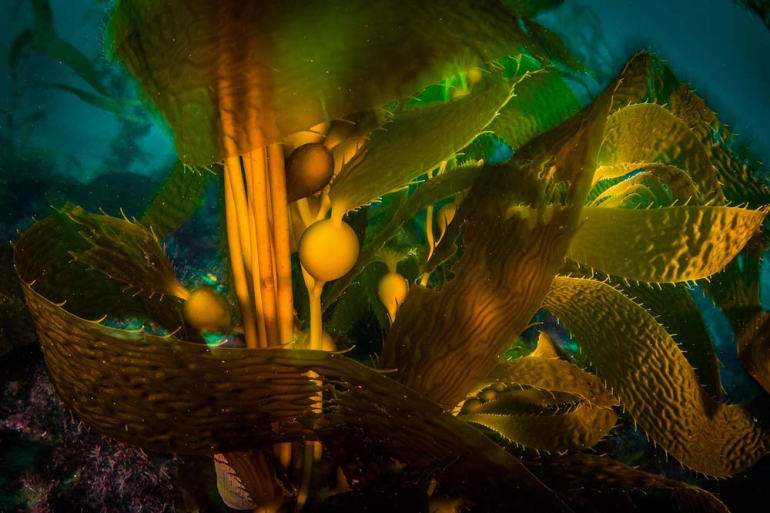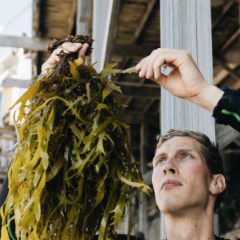Each year on World Oceans Day (8 June), we’re reminded of the ocean’s vital role in sustaining life on Earth and our responsibility to protect it. Covering 70% of the planet, oceans produce at least half of the world’s oxygen, support countless species (including us!), and regulate our climate by capturing around a quarter of the greenhouse gas (GHG) emissions produced by human activity.
This year’s theme, "Wonder", invites us to reconnect with the magic, mystery, and power of the ocean. As marine ecosystems face growing pressures from climate change, pollution, and biodiversity loss, wonder can become a catalyst for ocean protection and regeneration.
Oceans are under pressure
- Anthropogenic climate change is warming the ocean at an alarming rate (four times faster than it did 40 years ago) leading to coral bleaching and sea-level rise due to thermal expansion.[1]
- Overfishing is depleting marine life. An estimated 5 million fish are captured every minute; at that rate, the entire human population could be caught in just two days. Discarded fishing gear like nets and lines now make up nearly half of the Great Pacific Garbage Patch, entangling and killing marine animals. [2]
- Plastic pollution is choking our oceans. A truckload of plastic ends up in the sea every minute, harming marine animals and breaking down into toxic microplastics.[3]
- Noise pollution from ships and sonar disrupts marine mammals like whales and dolphins, affecting their ability to find food, communicate, and survive.
Ocean conservation in action at UNSW
At UNSW, research, education, and operations all play a role in protecting our oceans:
For example the Centre for Marine Science and Innovation (CMSI) and the Coastal and Regional Oceanography Lab explore:
- the impact of climate change on marine biodiversity
- sustainable fisheries and marine ecosystem restoration
- nature-based coastal protection and carbon sequestration
- ocean plastics and microplastic pollution pathways.
In operations, UNSW is working to reduce ocean-related impacts by:
- phasing out single-use plastics from campus outlets and encouraging reusable alternatives
- helping laboratories to improve their environmental outcomes and build a culture of sustainable practice through the Laboratory Efficiency Assessment Framework (LEAF) program
- diverting waste from landfill by treating general waste at a material recovery facility.
- committing to net zero GHG emissions by 2050, including by electrifying all campuses by 2030 and sourcing 100% renewable electricity
- switching our investments to low-carbon strategies and divesting investments in fossil fuel companies
Who’s working on solutions right here at UNSW?
This month we speak with Postdoctoral Fellow Aaron Eger from the School of Biological, Earth & Environmental Sciences.
- Can you summarise your project?
I am the founder of the Kelp Forest Alliance, a global mission to protect and restore 4 million hectares of underwater kelp forests by 2040. What began as a PhD project has grown into a worldwide network of scientists and stewards.
- How does your work contribute to the theme of world oceans day Wonder?
Imagine a forest that grew for 8,000 km across Southern Australia. Its branches filled with critters with three hearts or eight legs. These branches bob but do not drop as they are floating underwater. These are kelp forests, perhaps the longest continuous kelp forest on earth. They’re also under threat. Our work brings people and knowledge together to care for these essential habitats.
- What’s the most exciting or surprising thing about what you do?
Every time I dive, I feel like I’m entering a world that is completely different, and it feels like home. We grow up constrained by gravity, breathing without thinking, and feeling the warmth in our jackets. The ocean expels all these foundational experiences and provides the chance to move with total freedom, to draw one deep breath and slow your pulse, all well feeling enveloped in a chilly but exhilarating coolness. After I leave, I then wonder, how I can live without it.
- Who’s a researcher or project you’d recommend we keep an eye on in this space?
UNSW is a hub of regenerative ocean research. I recommend following Project Restore, the Living Seawalls, Operation Crayweed, Operation Posidonia, and the Kelp Forest Alliance. Keep an eye on Dr. Claudia Santori and Dr. Chanelle Webster who are both doing incredible work exploring the ocean’s wonder.
Find out more on the Kelp Forest Alliance and Aaron's work in this video.
What you can do
Every action makes a difference. Here are a few ways you can contribute to ocean regeneration:
- Eat for the ocean: Reduce seafood and meat consumption. Try more plant-based meals to reduce emissions and relieve pressure on marine ecosystems.
- Fly less: Challenge yourself to skip one domestic or international flight this year.
- Avoid single-use plastics: BYO cup, container, and cutlery — and support reusable options on campus.
- Join a beach clean-up: Check out Emu Parade for upcoming events in Sydney.
- Get inspired: Watch Ocean narrated by David Attenborough and follow @worldoceansday to support this campaign.
Most importantly, share your sense of wonder. What ocean moment moved you? Post it, tell a friend, or inspire someone to care. Wonder is contagious and it fuels action!
Happy World Oceans Day!
Let’s protect what inspires us.

